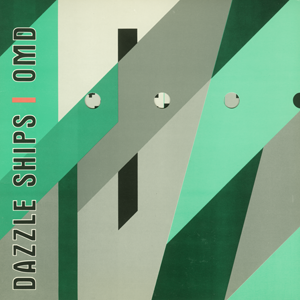| DAZZLE SHIPS | ||||||||||||||||||||||||||||||||||||||||||||||||||||||

|
|
|||||||||||||||||||||||||||||||||||||||||||||||||||||
|
||||||||||||||||||||||||||||||||||||||||||||||||||||||
NOTES'Radio Prague' is a radio recording of the call sign from the Czechoslovakian radio station of the same name. 'Genetic Engineering' was the first single released from the album. 'ABC Auto-Industry' features a recording from Czechoslovakian radio (actually by a presenter called Vladimir) who presented a weekly economic talk on Radio Prague. The theme was the use of robots in Czechoslovakian industry. The 'ABC' and '123' are by Paul Humphreys. 'Telegraph' was the second single released from the album but had originally been considered as the first release. 'This Is Helena' uses a recorded broadcast by a presenter from Radio Prague. 'International' was originally to have featured a lot more radio samples. The theme was to have reflected Andy's distaste at the time for the stupid things done by different countries due to differing political attitudes. The opening radio intro is the only remnant of that original idea. "I think that countries are a very inefficient way of organising the world" Andy once commented. 'Dazzle Ships (Parts II, III and VII)' was a sound collage designed to give the impression of ships in war. Most of the sound effects of ships and submarines were taken from a company that specialises in film soundtracks. The break in the middle, punctuated by a lone bass sound is actually Andy saying "Blue" but the sound has been fed into an Emulator. 'The Romance Of The Telescope' had originally been the B-side to the 1981 single 'Joan Of Arc' and was also remixed for inclusion on this album. The band considered this song - and also 'Of All The Things We've Made' - as too good to leave as B-sides. 'Of All The Things We've Made' was originally a B-side on the 12" release of the 1982 single 'Maid Of Orleans'. 'Silent Running' was originally called 'Walking On Air'. It takes its title from the science fiction film Silent Running (1971) which starred Bruce Dern. The film dealt with a fleet of spaceships preserving the last remaining forests of Earth and deals with Bruce Dern's actions when the order comes through to destroy them. The song itself has nothing to do with the theme of the film but the band simply liked the title. 'Radio Waves' is a reworked version of an early song by The Id, hence the credit for former Id member John Floyd who wrote some of the lyrics. The opening intro is actually a short wave radio digitally scanning radio frequencies. Radio Waves was considered as a possible single. 'Time Zones' uses a collection of telephone 'speaking clocks' from around the world. Another track titled 'Swiss Radio International' was recorded for the album. Like 'Radio Prague' it featured the call sign of the radio station and was once referred to as "The ice cream song" by Mal Holmes due to its similarity to the melodies played by ice cream vans. Another track that was under consideration was titled 'Square Dance'. Not much is known about this track although it appears to be more of a musical sketch or backing track rather than a completed song. It was previously unheard of until quite recently when Andy McCluskey was clearing out some material at his house and came across a tape dating to the Dazzle Ships period with the track on it. |
TRIVIAPeter Saville had seen the painting Dazzle Ships In Drydock At Liverpool (1919) by the painter Edward Wadsworth and was struck by the image. Dazzle Ships were World War 1 warships that had been painted in fractured and disjointed lines to confuse the enemy as to their exact size and distance. Wadsworth himself supervised the dazzle painting of many ships. After suggesting the idea and title to Andy, Saville carried the theme over to the sleeve design. The original sleeve was a gatefold which opened to show a map of the world with a series of dots that revealed the inner sleeve. This featured a yellow triangle against a pink background with a pink triangle against a yellow background on the reverse. Although OMD had now switched to parent company Virgin following the collapse of the DinDisc subsidary, there was a general feeling that OMD might benefit from appearing to maintain an independent position. This led to Dazzle Ships (and the subsequent singles) being issued on a made-up subsidiary label called Telegraph. 'Swiss Radio International' was dropped due to the band being unable to obtain the rights to use it. More recently Andy McCluskey commented that there was a dispute due to the seeming political bias of the tracks that were mooted for the album in its early stages. At that stage the album would have used Radio Prague, but also Radio Tirana. Swiss Radio International considered themselves neutral and the lack of Western radio stations was felt to give the project an uneven communist-leaning feel and so declined the use of the call sign. Swiss Radio International stopped broadcasting in 2004. |
